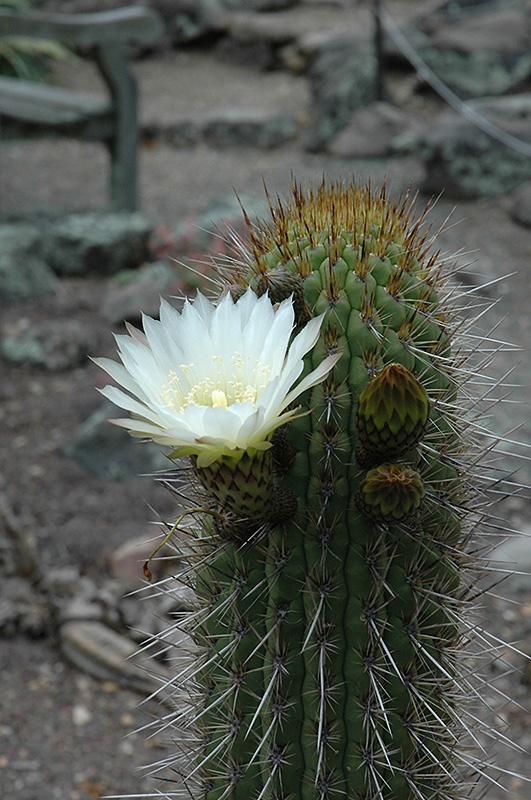Height: 3 feet
Spread: 12 inches
Sunlight:
![]()
![]()
Other Names: syn. Trichocereus chiloensis, Hedgehog Cactus
Description:
This cactus variety over time will create an impressive clump; very slow growing; white flowers are nocturnal; an excellent indoor accent plant
Features & Attributes
Chilean Cactus is a succulent evergreen plant. It is a member of the cactus family, which are grown primarily for their characteristic shapes, their interesting features and textures, and their high tolerance for hot, dry growing environments. Like all cacti, it doesn't actually have leaves, but rather modified succulent stems that comprise the bulk of the plant, and which are designed to hold water for long periods of time. This particular cactus is valued for its rigidly upright and cylindrical habit of growth, and usually grows as a single spiny ribbed grayish green stem. This plant features bold white cup-shaped flowers with creamy white eyes along the stems from mid spring to mid fall.
Planting & Growing
When grown indoors, Chilean Cactus can be expected to grow to be about 3 feet tall at maturity, with a spread of 12 inches. It grows at a slow rate, and under ideal conditions can be expected to live for approximately 100 years. This houseplant will do well in a location that gets either direct or indirect sunlight, although it will usually require a more brightly-lit environment than what artificial indoor lighting alone can provide. This is a unique plant in that it requires extremely dry, well-drained soil, and it will die if left in standing water for any length of time - in fact it will suffer if it is over-watered. The soil should be allowed to go completely dry to the touch an inch or two deep for prolonged periods, and it may only need watering once every few weeks. Be aware that your particular watering schedule may vary depending on its location in the room, the pot size, plant size and other conditions; if in doubt, ask one of our experts in the store for advice. Like most succulents and cacti, it prefers to grow in poor soils and should therefore never be fertilized. It is not particular as to soil type or pH; an average potting soil should work just fine.
There are many factors that will affect the ultimate height, spread and overall performance of a plant when grown indoors; among them, the size of the pot it's growing in, the amount of light it receives, the watering frequency and repotting schedule. Use the information described here as a guideline only; individual performance can and will vary. Please contact the store to speak with one of our experts if you are interested in further details concerning recommendations on pot size, watering, pruning, repotting, etc.
-- THIS IS A HOUSEPLANT AND IS NOT MEANT TO SURVIVE THE WINTER OUTDOORS IN OUR CLIMATE --
Disclaimer - This Plant Finder tool is an online resource representing many of the varieties that we carry over the course of the season, and is intended for informational purposes only. Inventory varies seasonally, so we cannot guarantee that every plant will be in stock at all times - please contact the store directly for current availability. It does not include our entire selection of plants, so be sure to visit our store to see varieties that may not be represented on this list.

